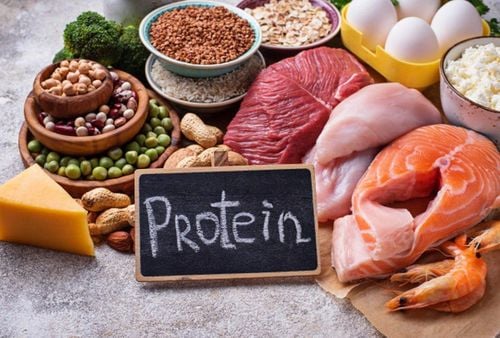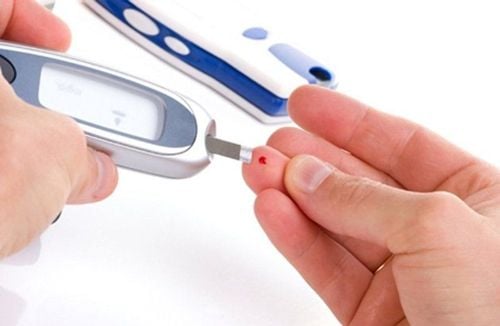This is an automatically translated article.
Regardless of the weight loss goal, weight loss for some people is sometimes impossible. However, losing a few pounds doesn't require a complete change in your current diet and lifestyle. In fact, making a few small changes to your morning routine can help you lose weight and maintain the results long after. Below are 10 simple habits related to breakfast, morning exercise that support weight loss, which can be incorporated into the diet and daily activities.1. Breakfast rich in protein
As many people know, breakfast is considered the most important meal of the day.What you eat for breakfast can set the tone for the whole day. Eating breakfast determines whether your energy levels and ability to focus will last until lunch or prompt you to take a break from work and eat a snack.
Having a protein-rich breakfast can help reduce cravings and aid in weight loss. In a study in 20 adolescent girls, eating a high-protein breakfast was more effective at reducing post-meal cravings than a regular breakfast. Another small study found that eating a high-protein breakfast was associated with less fat accumulation and reduced daily food intake and feelings of hunger compared with a regular breakfast.
Protein can also aid weight loss by reducing levels of ghrelin, the “hunger hormone” that increases appetite. In fact, one study in 15 men found that a high-protein breakfast inhibited ghrelin secretion more effectively than a high-carb breakfast. To get your day off to a good start, consider adding protein-rich food sources like eggs, Greek yogurt, cheese, nuts, and chia seeds.
In summary, studies show that a high-protein breakfast can help with weight loss by reducing cravings, and reducing ghrelin secretion.
2. Drink lots of water
Starting your day with a glass or two of water is an easy way to promote weight loss. Water can help increase your energy expenditure or the number of calories your body burns in as little as 60 minutes.In one small study, drinking 500ml of water resulted in an average 30% increase in metabolic rate. Another study found that overweight women were able to lose an extra 2kg within a year without any changes in their diet or physical activity habits, except for adding more than 1 liter of water per day. .
Furthermore, drinking enough water can reduce cravings and thereby reduce food intake. One study in 24 older adults found that drinking 500ml of water reduced calorie intake at breakfast by 13%.
In fact, most of the research on this topic has shown that drinking 1–2 liters of water per day can help with weight loss.
Starting the morning with water and staying hydrated throughout the day is a great way to promote weight loss without putting in too much effort. Increasing daily water intake has been associated with increased weight loss and energy expenditure, as well as decreased cravings.

Uống 1-2 cốc nước vào buổi sáng có thể thúc đẩy quá trình giảm cân
3. Self-check your weight
Standing on the scale and weighing yourself every morning can be an effective way to increase motivation and improve self-control.Some studies have suggested that daily self-weighing is associated with greater likelihood of weight loss. One study in 47 people found that those who were in the habit of weighing themselves every day lost about 6 kgs over six months compared to those who did it less often.
Another study reported that adults who weighed themselves daily lost an average of 4.4 kg over a two-year period, while those who weighed themselves once a month gained 2.1 kg .
Weighing yourself every morning can also help promote healthy habits and behaviors that are beneficial for weight loss.
In one large study, people who weighed themselves regularly had better self-control. What's more, people who don't care about weight on a regular basis are more likely to add large amounts of calories and lose self-discipline. For best results, weigh yourself as soon as you wake up.
Also, keep in mind that weight can fluctuate from day to day and can be influenced by many factors. You need to focus on long-term results and finding solutions instead of small day-to-day changes.
4. Sunbathing
Opening the blinds to let in sunlight or spending a few extra minutes outside each morning can help kickstart the weight loss process.One small study found that moderate light exposure at certain times of the day can affect weight. Furthermore, one animal study showed that exposure to UV radiation prevented weight gain in rats fed a high-fat diet.
Sun exposure is also the best way to meet vitamin D needs. Some studies have found that meeting the body's vitamin D needs can aid weight loss and even prevent weight gain. weigh.
A study of 218 overweight or obese women who took a vitamin D supplement or a placebo for one year. At the end of the study, those with adequate vitamin D requirements lost an average of 3.2 kg more than those deficient in vitamin D.
One study followed 4,659 older women continuously for 4 years and found found that high vitamin D intake was associated with less weight gain. The amount of sun exposure you need can vary depending on your skin type, season and location. However, spending time in sunlight or sitting outside for 10-15 minutes every morning can have a weight loss effect.
In short, sun exposure can affect weight. Sunshine can also help you meet your vitamin D needs, which can help with weight loss and prevent weight gain.

Tiếp xúc trực tiếp với ánh nắng có thể ảnh hưởng đến cân nặng
5. Practice mindfulness
Mindfulness is a practice that involves fully focusing on the present moment and bringing awareness to one's thoughts and feelings. Practicing mindfulness has been shown to help with weight loss and support the formation of healthy eating habits.For example, an analysis of 19 studies found that mindfulness-based interventions increased weight loss and decreased obesity-related eating behaviors.
Another review had similar findings, noting that mindfulness training resulted in significant weight loss in about 68% of the studies reviewed.
Practicing mindfulness is very simple. For starters, try taking five minutes each morning to sit comfortably in a quiet space and connect with your senses.
6. Actively exercise in the morning
Participating in some physical activity in the morning can help promote weight loss.A study in 50 overweight women measured the effects of aerobic exercise at different times of the day. Although there wasn't much difference in specific cravings between people who exercised in the morning versus in the afternoon, exercising in the morning was associated with higher feelings of fullness.
Morning exercise can also help keep blood sugar stable throughout the day. Low blood sugar can lead to many negative symptoms, including extreme hunger. One study in 35 people with type 1 diabetes found that exercising in the morning was associated with improved blood sugar control. However, these studies focused on very specific populations and showed association rather than causation. More research is needed on the effects of morning exercise in the general population.
In summary, several studies have found that exercising in the morning can help increase feelings of fullness and improve blood sugar control.

Tập thể dục buổi sáng cũng là cách giúp bạn giảm cân
7. Prepare your own lunch
Trying to plan and prepare lunch before going to work can be a simple way to make better food choices and boost weight loss.A large study of 40,554 people found that meal planning throughout the day was associated with a healthier, more varied diet and a reduced risk of obesity. Another study found that eating home-cooked meals regularly was associated with improved diet quality and a reduced risk of excess body fat accumulation. In fact, people who ate home-cooked meals at least five times per week were 28% less likely to be overweight than those who ate home-cooked meals three or less times per week.
Try setting aside a few hours one evening each week to plan and prepare breakfast and lunch before going to work.
Summary of studies show that meal planning and eating home-cooked meals are associated with improved meal quality and a reduced risk of obesity.
8. Sleep more
Going to bed a little earlier or setting the alarm clock later for extra sleep can help boost weight loss. Some studies have found that sleep deprivation may be linked to increased cravings. One small study found that limiting sleep time increased hunger and cravings, especially for high-carb, high-calorie foods.Lack of sleep is also associated with increased calorie intake. In one study, 12 participants consumed an average of 559 extra calories after just 4 hours of sleep.
Building a healthy sleep schedule is also an important part of a weight loss plan, alongside eating well and exercising. To maximize weight loss results, aim to get at least eight hours of sleep each night.
9. Change the route to work
While driving can be one of the most convenient ways to get to work, it may not be good for your waistline. Research shows that walking, biking, or using public transport can help reduce body weight and reduce the risk of weight gain.One study followed 822 people for 4 years and found that people who ride cars tend to gain weight more easily than those who don't. Similarly, a large study of 15,777 people showed that people who used public transport, either walking or cycling, were associated with significantly lower body mass index and body fat percentage. compared to private vehicle users. Changing your commute to work several times per week can be a simple way to boost weight loss.
In summary, walking, biking, and using public transport are all associated with less weight gain, lower body weight and body fat than driving to work.

Đi bộ hoặc đi xe đạp đi làm có thể giúp bạn giảm nguy cơ tăng cân
10. Start tracking your food intake
Keeping a food diary to track what you've eaten can be an effective way to help boost weight loss and hold yourself accountable for your eating.One study followed weight loss in 123 people for a year and found that keeping a food diary was associated with greater weight loss.
Another study found that people who regularly used a tracking system to self-monitor their diet and exercise lost more weight than those who did not regularly use the tracking system. Similarly, a study of 220 obese women found that regular and consistent use of self-monitoring improved long-term weight management. Try using an app or even just a pen and paper to record what you eat and drink, starting with the first meal of the day.
In summary, studies have found that using a food diary to track intake can help increase weight loss.
Making a few small changes to your morning routine can be an easy and effective way to boost weight loss. Practicing healthy behaviors in the morning can also help you start your day off well and achieve success. For best results, make sure to combine these morning routines with a well-rounded diet and other healthy lifestyle during the day.
Please dial HOTLINE for more information or register for an appointment HERE. Download MyVinmec app to make appointments faster and to manage your bookings easily.
Reference source: healthline.com












